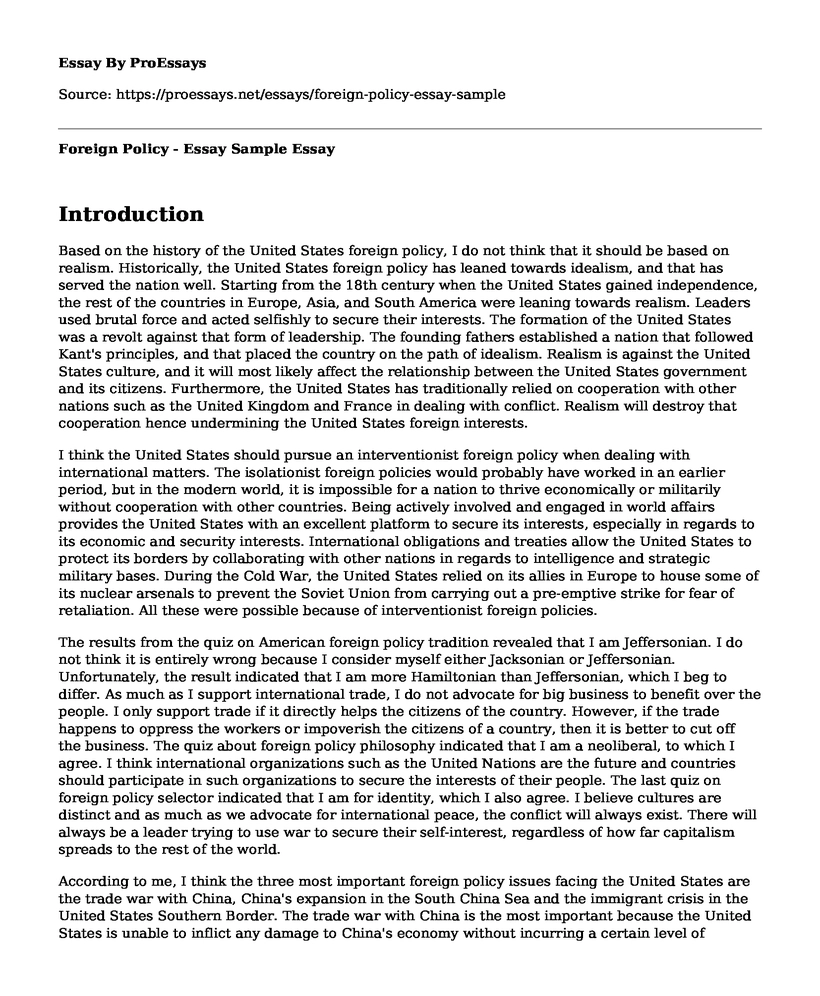Introduction
Based on the history of the United States foreign policy, I do not think that it should be based on realism. Historically, the United States foreign policy has leaned towards idealism, and that has served the nation well. Starting from the 18th century when the United States gained independence, the rest of the countries in Europe, Asia, and South America were leaning towards realism. Leaders used brutal force and acted selfishly to secure their interests. The formation of the United States was a revolt against that form of leadership. The founding fathers established a nation that followed Kant's principles, and that placed the country on the path of idealism. Realism is against the United States culture, and it will most likely affect the relationship between the United States government and its citizens. Furthermore, the United States has traditionally relied on cooperation with other nations such as the United Kingdom and France in dealing with conflict. Realism will destroy that cooperation hence undermining the United States foreign interests.
I think the United States should pursue an interventionist foreign policy when dealing with international matters. The isolationist foreign policies would probably have worked in an earlier period, but in the modern world, it is impossible for a nation to thrive economically or militarily without cooperation with other countries. Being actively involved and engaged in world affairs provides the United States with an excellent platform to secure its interests, especially in regards to its economic and security interests. International obligations and treaties allow the United States to protect its borders by collaborating with other nations in regards to intelligence and strategic military bases. During the Cold War, the United States relied on its allies in Europe to house some of its nuclear arsenals to prevent the Soviet Union from carrying out a pre-emptive strike for fear of retaliation. All these were possible because of interventionist foreign policies.
The results from the quiz on American foreign policy tradition revealed that I am Jeffersonian. I do not think it is entirely wrong because I consider myself either Jacksonian or Jeffersonian. Unfortunately, the result indicated that I am more Hamiltonian than Jeffersonian, which I beg to differ. As much as I support international trade, I do not advocate for big business to benefit over the people. I only support trade if it directly helps the citizens of the country. However, if the trade happens to oppress the workers or impoverish the citizens of a country, then it is better to cut off the business. The quiz about foreign policy philosophy indicated that I am a neoliberal, to which I agree. I think international organizations such as the United Nations are the future and countries should participate in such organizations to secure the interests of their people. The last quiz on foreign policy selector indicated that I am for identity, which I also agree. I believe cultures are distinct and as much as we advocate for international peace, the conflict will always exist. There will always be a leader trying to use war to secure their self-interest, regardless of how far capitalism spreads to the rest of the world.
According to me, I think the three most important foreign policy issues facing the United States are the trade war with China, China's expansion in the South China Sea and the immigrant crisis in the United States Southern Border. The trade war with China is the most important because the United States is unable to inflict any damage to China's economy without incurring a certain level of damage to its economy. The United States trade relations with China have been growing over the recent three decades, and the two nations have reached a stage where they are relying on each other for economic sustainability. Instead of picking a direct trade war with China, the United States should seek to increase the demand for its exports, which will offset the deficit and improve the country's Gross Domestic Product. The second foreign policy issue is the Chinese activities in the South China Sea (Lindsay par. 5). The United States should not risk a confrontation with China in the South China Sea. Instead, it should lobby using the other countries in the South China Sea such as Taiwan, Philippines or Japan. Its direct involvement in the matter would seem like a direct provocation of China and could lead to an unnecessary war. The final issue is the immigrant crisis in the Southern Border. The best way for the administration to solve the crisis is to work with the South American leaders to resettle the immigrants, including the Mexican government, which is allowing immigrants to flock to the United States Southern Border.
Works Cited
Lindsay, James M. Seven Foreign Policy Stories to Watch in 2018. 22 December 2017. Website. 11 March 2019. <https://www.cfr.org/blog/seven-foreign-policy-stories-watch-2018>.
Cite this page
Foreign Policy - Essay Sample. (2022, Dec 05). Retrieved from https://proessays.net/essays/foreign-policy-essay-sample
If you are the original author of this essay and no longer wish to have it published on the ProEssays website, please click below to request its removal:
- Powers of the Federal Government Essay
- Teachers Pay and Performance-Based Policies Essay Example
- The Rationality of Voting: An Analysis of Anthony Downs' Theory
- Essay Example on Ethiopia: Scarcity-Driven Challenges in Rural Areas
- Brazil: Corruption, Impunity, and Market Uncertainty - Essay Sample
- Essay Example on Healthcare Risk Management: Maximizing Quality & Compliance
- Planning Intervention for Hunger Concern in Cuyahoga County - Paper Example







